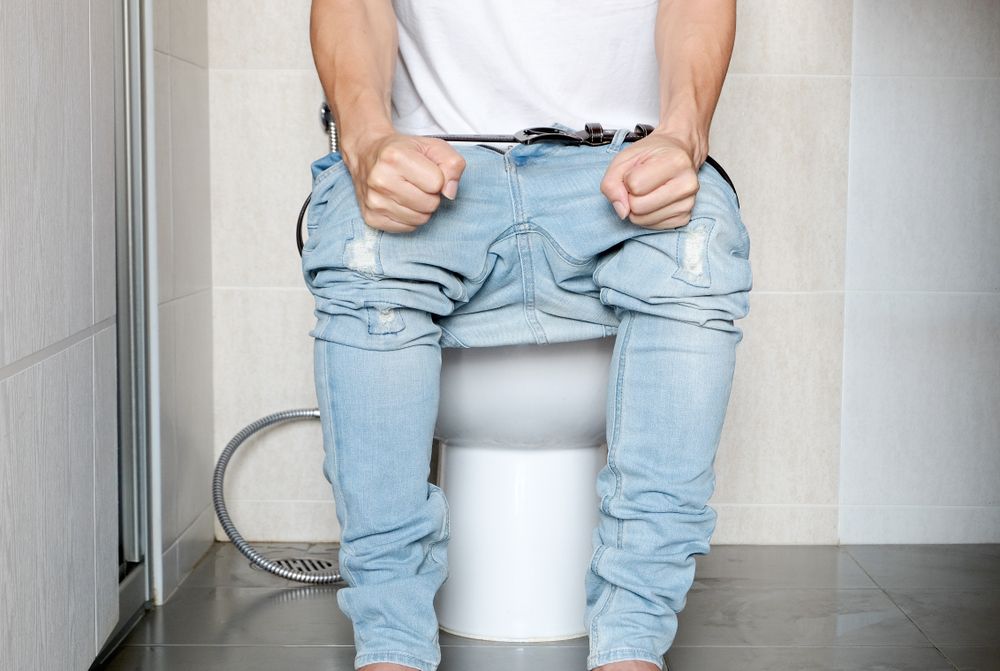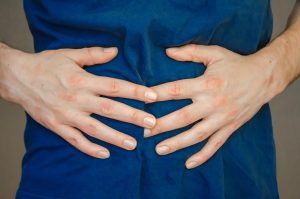Constipation is when a person suffers from infrequent bowel movements or otherwise has difficulty passing stool.
Chronic or severe constipation can be a sign of a serious medical condition, but many people suffer from occasional constipation. In either case, there are some changes that can be made at home to help with symptoms. (Learn More)
One of the most common causes of constipation is a poor diet. Adjusting your diet to take in more fiber, drink more water, and stop taking any unnecessary diet supplements associated with constipation can help. Just remember not to stop taking any supplements or medication that a doctor prescribed without talking to them first. (Learn More)
Exercise is another way to improve your body’s ability to pass bowel movements. Regular physical exercise can increase muscle activity in the intestines, which is key to passing a healthy bowel movement. Exercise can help the body in a variety of other ways, with generally no downside and minimal risk. If you have a health condition, talk to a doctor about the safest way for you to exercise. (Learn More)
Bowel training can be used to combat constipation. It teaches your body to defecate on a schedule, such as after eating breakfast. Eating helps the colon move stool, so this habit can reduce constipation. Your doctor can teach you strategies to get your body into a healthy rhythm. (Learn More)
Laxatives can help some people with constipation, but they carry many more caveats and risks than other options. Their effect on the body is pretty serious, and they should only be taken after researching the risks associated with them. Always read the labels carefully, and make sure you see a doctor if you experience serious symptoms. (Learn More)
How Constipation Works
Constipation is when a person suffers from infrequent bowel movements or difficulty passing stool. While most people suffer from very occasional constipation, being chronically constipated is not normal and could signal a bigger issue.
Suffering from constipation can be embarrassing and interfere with day-to-day tasks. It can also make a person physically uncomfortable, with serious complications that are rare but possible. Symptoms of serious constipation include:
- Passing fewer than three stools a week.
- Having lumpy or hard stools.
- Straining when trying to pass bowel movements.
- Feeling as though there’s a blockage in your rectum preventing bowel movements.
- Feeling as though you can’t completely empty the stool from your rectum.
- Needing to press your hands on your abdomen or use a finger to remove stool from your rectum.
Many people who suffer from occasional constipation will not experience symptoms as severe as those above. If you experience the above, contact a doctor.
For both chronic and occasional constipation, there are some at-home remedies that can help with symptoms.
Changing Your Diet to Alleviate Constipation
For most people, constipation is caused by a diet that is in some way disagreeable to them. Oftentimes, a better diet can lead to significant improvements.
To help with constipation, try these tips:
- Increase your fiber intake. Unless told otherwise by a doctor, try to eat about 14 grams of fiber for every 1,000 calories you take in. Fresh fruits, vegetables, and whole-grain foods are all rich in fiber. Increase your consumption of these things slowly to prevent any problems due to the sudden change.
- Drink plenty of fluids. Water and other liquids can aid in bowel movements. If you’re dehydrated, your stool will be hard and more difficult to pass.
- Consider stopping certain diet supplements. Some diet supplements and medications can cause constipation. Consult a doctor before you stop taking anything, especially prescribed medication.
Consider talking to a doctor or nutritionist about how to eat healthier. These professionals can help ensure you get the nutrition you need while combating constipation.
Exercise to Encourage Bowel Movements
Regular physical exercise can increase muscle activity in the intestines, helping your body to better pass bowel movements. Aim to exercise every day, or nearly every day, for best results.
In addition to helping with bowel movements, consistent, moderate exercise will improve health overall. Better health means your digestive systems can function at its optimal level.
Patients in poor health or who have not exercised for a long time should ask their doctor if they are healthy enough to exercise regularly. Some patients may need to build up to that level of activity. In some cases, it may even be dangerous to exercise at this level. Follow your doctor’s advice for how to progress with an exercise regime.
Bowel Training
If you have chronic constipation problems, bowel training may help. This is simply training your body to have bowel movements on a relatively regular schedule.
For example, with bowel training, you may try to have a bowel movement 15 to 45 minutes after eating breakfast every day. Eating helps the colon move stool, so this habit can reduce constipation. The idea is that with regular practice, your body will become conditioned to have a bowel movement at this time.
Part of bowel training is learning to give yourself enough time for bowel movements and to go as soon as you need to. For further help, research how to best relax your muscles.
Also, maximize toilet ergonomics. Although not often discussed, the toilets most Americans use are not ergonomically ideal for bowel movements, even if the design remains functional. There are devices that can be used to promote a better position for defecation.
Are Laxatives a Good Idea?
Laxatives can help some people with serious constipation have better bowel movements, but they come with risks.
Different types of laxatives have different mechanisms. Some draw water into the colon; some help form stool that is easier to pass; and others trigger intestinal muscles to help them pass bowel movements more easily. Bulk-forming laxatives, often just called fiber supplements, are usually the safest to use.
Unless your doctor says otherwise, caution should be used when deciding whether or not to use laxatives. Their overuse can be dangerous, potentially causing the following issues:
- Bloody stools
- Severe cramps or pain
- Weakness
- Tiredness
- Dizziness
- Rectal bleeding
- Changes in bowel patterns
- Long-lasting constipation
If you experience any of the above, contact a doctor immediately.
If you’re going to use laxatives, first try all the above advice to encourage more regular bowel movements. Always read the labels on the laxative products, and make sure they do not interact with any medications you’re taking. Laxatives can interact with antibiotics as well as certain heart and bone medications.
Women who are pregnant or breastfeeding, children, and those with health conditions should talk to a doctor before using a laxative. While bulk-forming laxatives and stool softeners are usually safe during pregnancy, stimulant laxatives can be dangerous.
References
Constipation: Symptoms & Causes. (June 2019). Mayo Clinic.
Constipation: Diagnosis & Treatment. (June 2019). Mayo Clinic.
Over-the-Counter Laxatives for Constipation: Use With Caution. (June 2017). Mayo Clinic.
Treatment for Constipation. (May 2018). National Institute of Diabetes and Digestive and Kidney Disease.
Bowel Retraining. MedlinePlus.





